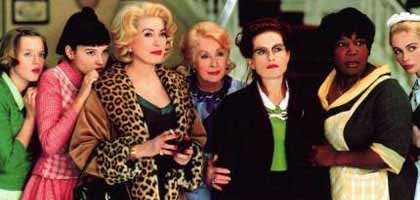
8 Women
France/Italy 2001

Reviewed by Ginette Vincendeau
Synopsis
Our synopses give away the plot in full, including surprise twists.
France, the 1950s. Young Suzon (Virginie Ledoyen) returns to her home - an isolated country house - for Christmas. She is welcomed by her wheelchair-user grandmother Mamy (Danielle Darrieux), her glamorous mother Gaby (Catherine Deneuve) and sickly maiden aunt Augustine (Isabelle Huppert), her younger sister Catherine (Ludivine Sagnier), who is a fan of detective stories, the nanny Chanel (Firmine Richard) and the new maid Louise (Emmanuelle Béart). Her father Marcel (Dominique Lamure) is found dead, but they are unable to phone the police as the telephone wire has been cut. Mamy springs from her wheelchair, revealing she can walk.
Realising the killer must be in the house, the women begin discussing each other's movements. Truths and counter-truths, suspicions and rivalries begin to unfold in speech, song and dance. The broken-down car and heavy snowfall mean escape is impossible. Pierrette, Marcel's estranged sister, arrives after an anonymous telephone call tells her he is dead. His bedroom door now will not open. Many secrets come to light: that Louise slept with Marcel, that Chanel loves Pierrette, that Suzon is pregnant (and was at home the night before), that Suzon is not Marcel's daughter (which is just as well since she is pregnant with his child), that Gaby was about to leave with Marcel's business associate (who was also Pierrette's lover) and that Mamy had poisoned her husband a long time ago. Chanel is shot and, though not killed, is rendered speechless. Frumpy Augustine appears transformed in a glamorous dress. Gaby and Pierrette fight but end up kissing. Catherine reveals that Marcel is not dead and that she had plotted everything in order to show her father the truth about "his women". As she opens the door to his bedroom, he shoots himself in the head.
Review
François Ozon's 8 Women is a bubble of pastiche cinema (and theatre) with a dream cast of glamorous French stars - Catherine Deneuve, Isabelle Huppert, Emmanuelle Béart, Fanny Ardant, Virginie Ledoyen and the veteran Danielle Darrieux (a prodigy of the 1930s and the star of some of Max Ophuls' films from the 1950s). Colours, costumes and song-and-dance numbers are pure kitsch and the whodunit plot deliberately improbable: eight women are trapped in a country mansion after a man (Marcel) has been murdered. Marcel's mother-in-law Mamy (Darrieux), his glamorous wife Gaby (Deneuve) and daughters Suzon (Ledoyen) and Catherine (Ludivine Sagnier), his sister-in-law, the old maid Augustine (Huppert), his 'scandalous' sister Pierrette (Ardant), the nanny Chanel (Firmine Richard) and the maid Louise (Béart) all could have killed him for love or money. For the duration of the film the eight women - isolated by snow and cut-off telephone wires - bitch at each other, only stopping now and then to burst into song.
Deliberate artifice rules, as do cinematic references, right from the opening credits which unfold in pink letters over crystal baubles, like the shower of diamonds in Douglas Sirk's Imitation of Life (1959). The film continues as a game of references beyond Sirk: to Vincente Minnelli's musicals, Gilda (1946), Jacques Demy, boulevard theatre, Hitchcock, and Ozon's first feature Sitcom (1997), as well as to the actresses' own careers (Darrieux and Deneuve, for instance, have played mother and daughter in three films before 8 Women).
With its multi-layered revelations, 8 Women plays like speeded-up soap opera: plot turns that hinge on sibling rivalry, incest, pregnancy, murder, adultery and a kinky maid sleeping with her master but in love with her mistress pile up so fast we soon stop caring. The lovingly crafted colour, lighting and costumes evoke films that were already 'artificial', but there is a difference here. The mise en scène of, say, Imitation of Life was also a critique of that artificial world, a glossy and hollow counterpoint to deep emotions. In 8 Women the plot is so contrived that laughter is the only possible reaction and the strategy of visual pastiche is pure self-reference.
A closer precedent for 8 Women is George Cukor's 1939 adaptation of Clare Boothe's play The Women (which Ozon wanted to remake, but in the absence of the rights, currently in the possession of Julia Roberts and Meg Ryan, he turned to a forgotten 1960s French play by Robert Thomas). As in Cukor's film, the characters here are all women - we never see Marcel though he is much discussed throughout. And as with Cukor's film, discussion of 8 Women revolves around whether it's a glorious celebration of womanhood or devastating misogyny. Ozon has been keen to distance himself from The Women in exactly these terms: "Cukor regards his women as monsters. We don't like any of them. In 8 Women, even if [the female characters] occasionally fight like fishwives, I wanted them to be moving, I wanted people to feel close to them." I'm not sure he succeeds. It's true that men in 8 Women are redundant rather than the ultimate goal of the female characters, as they are in the more conservative The Women. It's true also that Ozon has added 'modern' details such as Mamy's revelation of the boredom of her married life. Yet 8 Women, like The Women, presents women endlessly fighting in a hot-house of overblown femininity, each of them introduced as a "carnivorous" flower. Barely hidden under the humour is a fantasy of beautiful but 'tragic' and faintly pathetic older women, not so far from Charlotte Rampling's glacial English lecturer in Ozon's earlier Sous le sable. I would agree with Deneuve, who said to Libération: "I am not sure Ozon likes women, but he likes actresses."s
In this respect, 8 Women is a feast. Each performance is beautifully controlled, notably Huppert's devastating comic turn as Augustine, and integrated into a seamless ensemble. For actresses used to brutally realistic contemporary auteur cinema, to be flattered by lighting and gorgeous costumes (Dior's New Look filtered by Hollywood) must have been an enjoyable change. The costume designer's admission that "It was the intention that the costumes be perceived as weapons in the women's competitiveness" unwittingly hints at the film's underlying misogyny, but the deep colours and sumptuous fabrics are still a joy. Deneuve's green velvet dress and panther-collared coat and Ardant's deep red and black outfit are particularly delicious. Each actress has her scene and her song, starting with the youngest and ending with Danielle Darrieux's moving rendering of 'Il n'y a pas d'amour heureux' (the most famous and best song in the film, a poem by Louis Aragon set to music by Georges Brassens). Like the rest of the film, the numbers play on the contrast between high artificiality and authentic feeling: can sentimental popular tunes hold profound emotional truth?
Ozon's reference point may be 1950s Hollywood, but the considerable success of his film in France rests as much on his nostalgic homage to French popular music and French actresses as on the marketing coup represented by his multi-star cast. Yes, there is a whiff of vacuity and misogyny about 8 Women, but as in the other deliberately 'artificial' French film of 2001, Amélie, the euphoria of the spectacle is sufficient to keep these objections in the background.
Credits
- Director
- François Ozon
- Producers
- Olivier Delbosc
- Marc Missonnier
- Screenplay
- François Ozon
- With the collaboration of
- Marina de Van
- Based on the play by
- Robert Thomas
- Director of Photography
- Jeanne Lapoirie
- Editor
- Laurence Bawedin
- Art Director
- Arnaud de Moléron
- Music
- Krishna Levy
